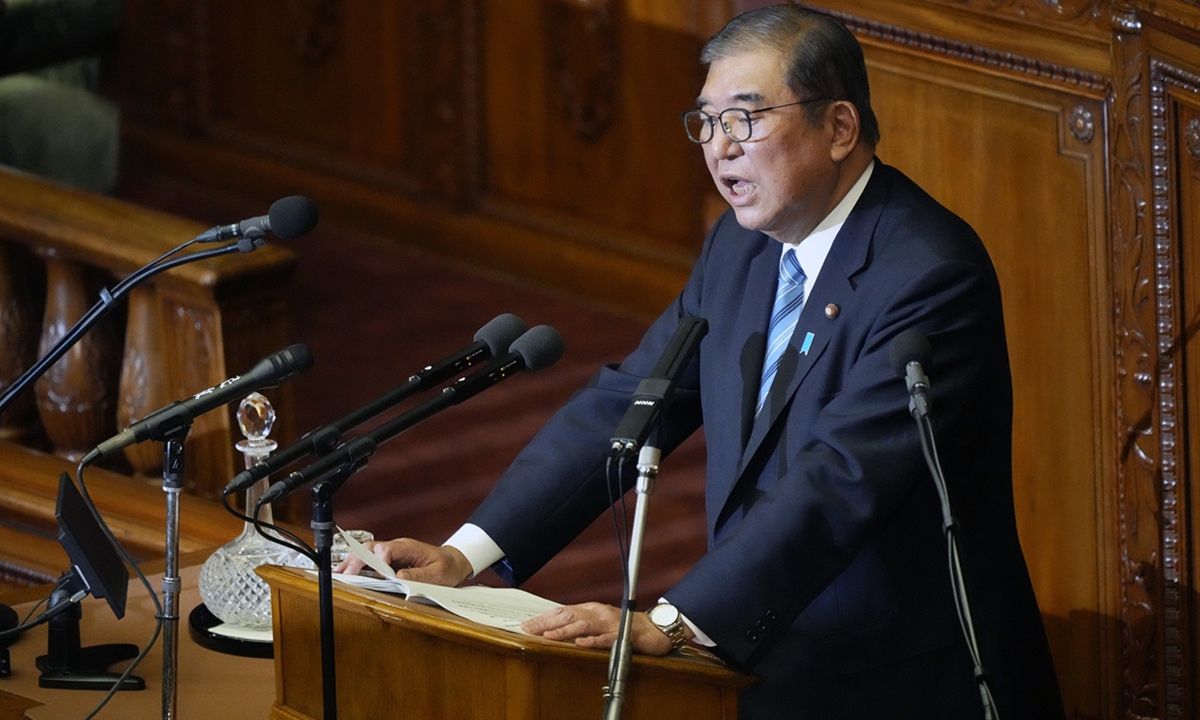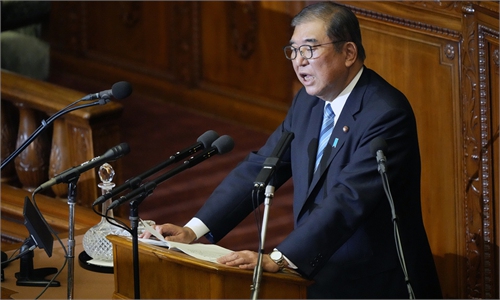
Japanese Prime Minister Shigeru Ishiba delivers his policy speech at the extraordinary session of parliament's lower house Friday, Nov. 29, 2024, in Tokyo. (Photo: VCG)
After the announcement of the US' election results, a group of US allies has been feeling anxious, with Japan's mind-set appearing to be the most complex.On the one hand, given the fact that Japan has been widely recognized by both parties in the US as a loyal ally in recent years, Tokyo expects the incoming US administration to "have mercy on it." On the other hand, Japan has to face the US' possible return to unilateralism and isolationism and prepare for its impact. Most opinions in Japan are pessimistic about the prospects for its relations with the US, with some claiming that the "honeymoon phase" between Japan and the US will inevitably cool down.
Prime Minister Shigeru Ishiba won't be meeting US President-elect Donald Trump before the latter's inauguration later this month, Japanese media reported Tuesday. The Japanese leader stated that when it comes to the new US administration, it's not "a good idea to rush things." According to the Japan Times, Ishiba was unable to meet Trump in the US in November despite reportedly making a number of requests. Although Trump's team cited the Logan Act as the reason, the incoming US president still managed to meet with other leaders following his victory in the presidential election.
This situation seems to set the stage for a bleak outlook for Japan-US relations over the next four years.
During the Joe Biden administration, the Japan-US alliance has become increasingly solid, even experiencing "unprecedented upgrades."
In Washington's efforts to promote the "Indo-Pacific Strategy" aiming at containing China, the Japan-US alliance has been enhanced in all aspects. First, Japan's position in the US' global strategy has risen significantly. Second, the US continues to make use of Japan, with the two countries reaching agreements in strengthening cooperation in the defense industry, key industries and emerging technologies. Third, Japan plays a more significant role in the US' alliance system, as an increasing number of Washington-led minilateral cooperation mechanisms in the Asia-Pacific are based on the model of "Japan-US plus."
These developments in the Japan-US alliance seem to have instilled a sense of confidence in Ishiba. In September, during the Liberal Democratic Party presidential election, Ishiba did not shy away from advocating for the revision of the Japan-US Security Treaty and Status of Forces Agreement, as well as proposing the idea of stationing the Japanese Self-Defense Forces in the US territory of Guam. However, with the Biden administration coming to an end, some fear that Ishiba's proposals will have to be temporarily "put aside."
Regarding the incoming US administration's possible policy orientation toward Japan, it is widely believed that Japan will face at least three pressures from the US side: the demand for Japan to bear more cost of US troops stationed in the country, the potential use of trade tariffs and the issue of the yen's exchange rate.
Recently, a Japanese scholar told me that both parties in the US have a high degree of consensus on the importance of the Japan-US alliance, thus the bilateral relations should not suffer a major setback. However, the "honeymoon phase" may be difficult to continue, as there are concerns that the Japan-US alliance will not receive special treatment again. The incoming US administration does not reject the idea of an alliance, but based on its "America First" mentality, it expects allies to shoulder more defense costs and obligations.
As a result, Tokyo has to prepare to "pay more" to ensure that Washington continues to fulfill its commitment to Japan's defense. At the same time, in response to potential trade tariff pressures from the US, Japan will have to collaborate with other US allies to lobby the US for more room to maneuver.
In light of the uncertainties surrounding US foreign policy in the next four years, in addition to strengthening diplomatic lobbying for the incoming US administration, Tokyo also needs to change.
Japan must shift from a policy of "taking the side of the US" during the previous administration under Fumio Kishida to one that demonstrates balanced pragmatism and strategic autonomy. This shift requires not only a change in Japan's rigid strategic thinking, which has been based on geopolitics and camp confrontation, but also greater efforts to improve relations with its Asian neighbors.
The author is a research fellow of the Department for Asia-Pacific Studies of the China Institute of International Studies. opinion@globaltimes.com.cn


